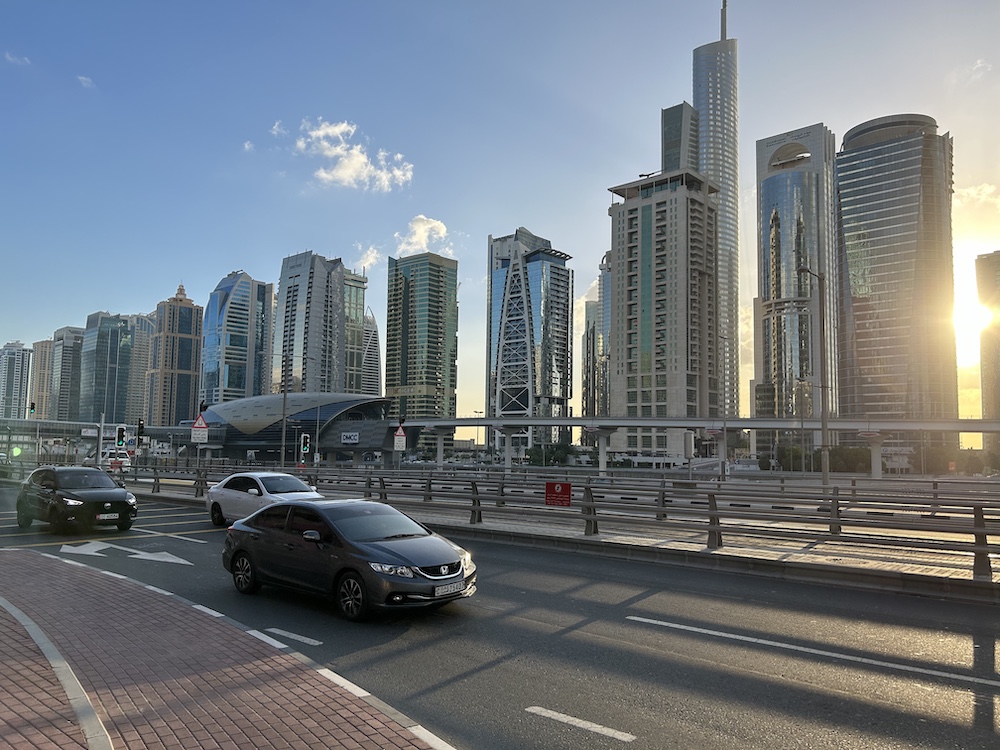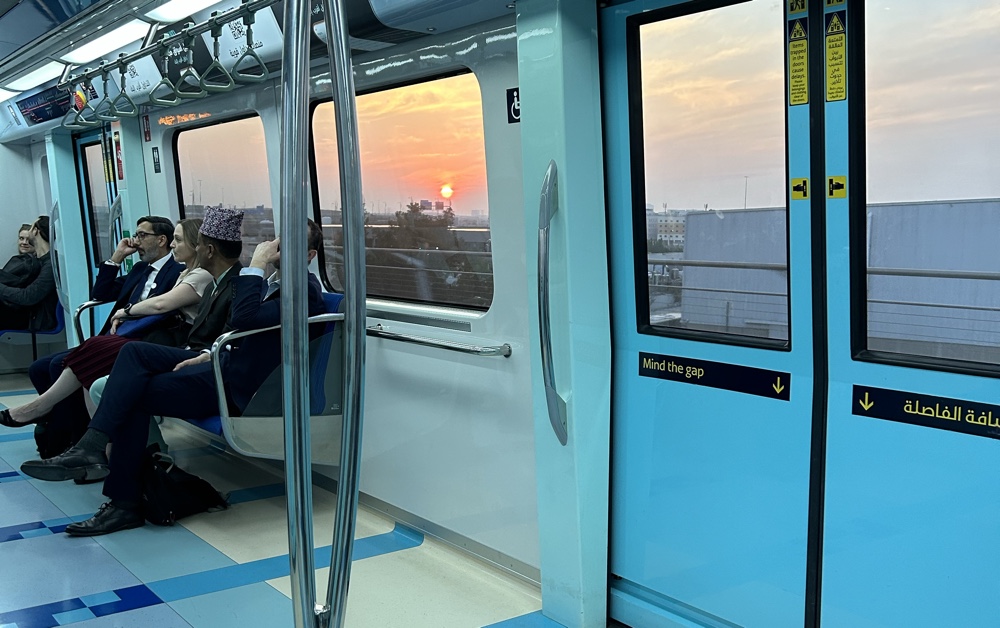
For my first three days in Dubai I kept trying to figure out why it all seemed so familiar. I’ve never been here before, although I’ve visited Tel-Aviv and Cairo – which are vastly different cities despite being in the Middle East.
The city is vast. It stretches for over 20 miles along the Persian Gulf coast, surrounded by desert. While the city was originally founded along a small creek, almost none of the modern city is now oriented along that waterway. Instead, the Emiratis have dug extensive ditches in the sand from the ocean, filled them with seawater, and decorated them with “starchitect” creations and emporiums of the rich playlands. Beaches, malls, river walks, a “dolphinarium” and places to lounge in your Prada while you contemplate whether to buy a new Ferrari or Porsche.
In between are rows upon rows of apartment buildings. Everything is new with marble cladding or blue glass enclosures, touting pools, spas, and luxury kitchens – all in English. There are no neighborhoods, only real estate developments calibrated for maximum profit.
The outsides and the tops of the buildings are glamorous, but get down to the ground level, where the humans are, it gets dusty.
I’m in town for two weeks for the U.N. climate negotiations (please read my daily newsletter) and to save money I forwent a hotel for an Airbnb near the metro stop that can take me to the conference location. The conference is at Dubai Expo City, a whole other colossus, placed at the south edge of the city. Because I wanted a short metro ride every morning, my apartment is on the southern edge of the city, far from the most luxurious hotels, where the working middle class seems to live.
Although my apartment is on the 27th floor, every morning at 5:30 a.m. I’m woken up by the call to prayer from the mosque across the street. My neighborhood – and my apartment – seems to be mostly Russians and Indians, all working in tech or finance, judging by what I see them wearing. The sidewalks, which are wide and covered with pavers, are mostly empty during the day, but bustle at night as everyone heads to the grocery store or grabs a bite at the many “cafeterias” that fill apartment building bottom floors.
I’ve learned something interesting: packaged goods, like chips and frozen food, are very expensive. There are no locally grown foods in the UAE, but produce imported from Europe and Africa are expensive. The cheap stuff comes from China and Asia – and it usually isn’t very good.
The couple of times I’ve eaten in a hotel restaurant has been more like a western experience, with food tuned for western palates. But it’s all very expensive – close to US$80 a person to start. But a meal in a neighborhood cafeteria, I’ve eaten in a different one almost every night, tends to cost around US$8. Chicken biryani, Turkish food, Indian, Cantonese. There’s plenty of choices that are light on the wallet.
But despite the buzz of different cultures in the streets of Dubai, it occurs in the cracks of things, rather than centerstage. The streets have no crosswalks and are packed with unmoving traffic. Sidewalks are nonsensical: sometimes broad, sometimes narrow. Shops are rarely at ground level, usually you have to go up five or six stone steps to a building’s lobby level. Although there’s a metro, the stops are infrequent, and to access the platform you need to traverse a quarter mile long overpass that is thankfully air conditioned and includes two moving walkways to speed your travel.
Lots of people use electric scooters to get around. It makes sense, considering how far apart things tend to be.
Taking the metro, you encounter an incredible polyglot – tall, short, every different race, and a bewildering mix of Hindi, Mandarin, English, Russian, and whatever else I don’t understand. Every person is moving along, with little interest in their neighbor other than to make sure they don’t bump into them as they move down corridors. It is impersonal, yet practical. Diversity as a fact. Everyone is here to make money, so don’t make any trouble, OK?
Living as someone who takes the metro and is not in a hotel, I’m discovering that this city is not built for me. It’s made for people in cars, whisked along the fourteen lane highway, lined with three-storey tall billboards advertising luxury brands and condos. These people have no need for reasonably priced meals. When they want to amble, they can do it along the luxury-minded, human-created waterways.

Amongst this, I’ve been wracking my brain, trying to figure out why this is so familiar. And then I listened to the sound of the metro. It’s a super-modern, electric, robot-driven train. The sound.
The sound is the same sound the transport makes in the Star Wars spin off, Andor.
I know. I know. Nerd alert! But really, if you haven’t seen Andor, go get a Disney+ subscription and watch it all. It’s the best of everything Star Wars because it’s really not so much about pew-pew spaceships (although there’s a bit of that) and more about the struggle of living in a fascist corporate-state with nothing at human scale. It’s all about profits and the grandiose ambition of an elite shepherded around in expensive vehicles.
Sound familiar?
Dubai is Andor. The city is purpose-built for the sake of commerce. It has no geographic relation to its place, which means you can build anything you want, anywhere. And people do! There’s giant “marinas” filled with pleasure craft and lined with walkways limited to paying residents. Huge malls that defy belief. The Burj Kalifa Mall has over 1,200 stores and seems to stretch on forever. The Mall of the Emirates is smaller, but it has an indoor ski hill that, when I visited, was genuinely cold and filled with actual snow you can ski on (watch my video).
I keep looking, but I can’t really find much culture. Places for music, or having a lazy, cheap coffee, or parks! There are no public parks here.
Nothing here makes sense until you understand that everything is driven by money and the interest in making money. It’s not a place to grow old and settle in, but rather a pumping vessel of commerce, rolling over anyone who trips and falls along the way.
I’ve got six more days here. I’m not sure I’ll ever want to come back.